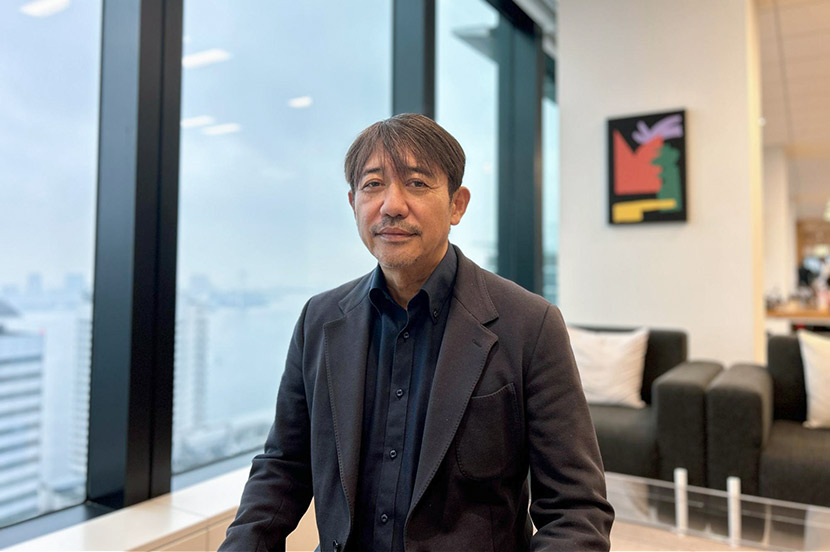
As a company that provides telecommunications and IT services as its main business, SoftBank Corp. (TOKYO: 9434) believes that contributing to the Sustainable Development Goals (SDGs) not only helps solve social issues in various situations; it is also convinced that working to achieve the SDGs can help respond to the demands of external stakeholders and propel company growth.
SoftBank News spoke to a person in charge of one of SoftBank’s SDGs actions–an endeavor aimed at enhancing the quality of education in unconnected regions of Africa by delivering telecommunications from the sky. Below is a firsthand account.

Motoi Matsumoto
Deputy Director
Global Communication Division
Product Technology Division
Technology Unit, SoftBank Corp.
First joined SoftBank in 2000. After serving as a representative for Group companies for 11 years, Matsumoto led SoftBank’s global business strategies and human resources before becoming a Deputy Director in the Global Communication Division to spearhead projects in Africa.
Bringing communications to impoverished regions
Africa is the only place in the world that is continuing to see population growth. A growing population means more consumption, increased prosperity for producers, and the birth of new industries. However, low incomes in Africa are a significant issue, and many are trapped in a cycle of poverty. While many have incomes, the high cost of services is a barrier to their utilization, and telecommunications is one such example.
In urban areas, mobile networks and Internet infrastructure are well-established, but in suburban and rural areas, connectivity is sparse. Some suburbs have Internet access, but the costs to connect are prohibitively high for ordinary citizens. From a business perspective, focusing on profits makes it challenging to provide services in these areas. So it's crucial to create frameworks that factor in both urban and suburban areas as part of a sustainable business cycle. This is the challenge I’m working on.

A satellite antenna installed on the rooftop of a rural school in Rwanda
In most parts of Africa, signals are delivered by satellite. However, in areas without electricity, ground-based antennas can’t function, and this makes it technically challenging to receive satellite signals. To bypass antennas on the ground and deliver connectivity directly to devices, SoftBank is conducting research on High Altitude Platform Station (HAPS) stratospheric-based wireless communication systems. HAPS is a technology that can effectively provide communication to rural and suburban areas in African countries located near the equator, where many impoverished people live, without the need for an electrical supply on the ground.
SoftBank is working to help double Africa's broadband penetration rate to 51% by 2025. Representing SoftBank on the board of Smart Africa, a non-profit led by the President of Rwanda and joined by 38 African countries and multinationals, we’re working to enable Africa's digitalization with technologies like HAPS. However, to provide stable communication services with HAPS, further technological innovation is required. Anticipating this, as a step forward we launched an educational technology (EdTech) project in Rwanda, a leading IT nation in Africa, using satellite communications.
SoftBank’s HAPS and the SDGs

“Building high-quality social communication networks” and “connecting people and information to create new excitement” are two of the managerial priorities (materiality, or key initiatives) SoftBank has identified, and by building stable telecommunication networks, it is working to foster an environment where all people have equal access to information. This initiative is helping to achieve SDGs Goal 9: “Build resilient infrastructure, promote inclusive and sustainable industrialization and foster innovation,” and Goal 10: “Reduce inequality within and among countries.” The HAPS business will play a key role in promoting this SoftBank initiative.
Focusing on education as a first step to nurture an industry
The number of children in Rwanda is increasing, but the number of qualified teachers is not keeping pace. Over 1,500 schools lack proper communication infrastructure, and this has resulted in educational disparities. Our initial focus is to improve communication infrastructure and enhance the quality of education through content delivery and classroom development. Our current EdTech project utilizes satellite antennas and Wi-Fi access points to provide communication and video-based educational content, and this is enabling children in rural and suburban areas to access high-quality educational instruction at their schools.
The gap in educational quality between private and public schools is vast. Even middle-income families in the capital city send their children to private schools. Unlike private schools, public schools lack funding. I believe that improving the quality of public education has great significance for the country.
An unforgettable experience in Kenya
My connection with Africa started about 13 years ago. As a representative of a group company I was working for at the time, I made a modest donation to what was considered the poorest school in Kenya. What shocked me then was the reality that parents wouldn't send their children to school if meals weren’t provided. If there was no school lunch, they preferred that their children stay home to help with housework or cutting grass. These parents couldn’t see the benefit of sending their children to school, perhaps because of the way they were raised and the importance of education was not conveyed to them.
The government and schools are aware of this challenge and work to persuade parents to send their children to school by offering meals. Sadly, the school lunches I saw consisted only of cooked beans.
One scene remains indelibly etched in my mind. When I asked the children at the school I donated to about their future dreams, one child wanted to be a doctor. The child said he wanted to be a doctor because his siblings couldn’t get medical help and died. Even after leaving Africa for a while, those scenes and words never left me. Now, as I work to eliminate the digital divide in Africa through satellite and HAPS communications, I feel as though this experience is connected to what I’m doing now in a meaningful way.

Making transformative services affordable a life mission
It's been four years since I started working on the African EdTech project, and I find it incredibly fulfilling. My mission is to create a sustainable business model that encourages long-term economic cycles and profitability. I feel like I'm just at the beginning of this journey.
Initially, realizing affordable satellite communications was an uncertain prospect, but we’ve been progressively working on the system. Africa's population continues to grow, and the challenge is how affordably we can provide communication services. If necessary, we're prepared to provide electricity and devices as part of the package, offering a total solution that's accessible and transformative. I believe it’s necessary to see if my ideas can lead to solutions.
Since I was a child, I've always been interested in making people around me happy, whether they're children in Africa or in my own family. There's no sense of self-sacrifice in this; I enjoy the challenge, and though it doesn’t always work out, it has contributed to my happiness. Going forward, I want to expand our activities beyond Rwanda, working closely together with partners both inside and outside the company.

Related news
- Press Release: SoftBank Corp. and Rwanda's Ministry of Education Sign Agreement to Provide Educational Technology Service in Rwanda That Utilizes Non-Terrestrial Network Solutions
- Press Release: SoftBank Corp. and Smart Africa Secretariat Agree to Collaborate on Providing Affordable Broadband Solutions to Enable the Digital Transformation of Africa
(Posted on March 25, 2024)
by SoftBank News Editors



